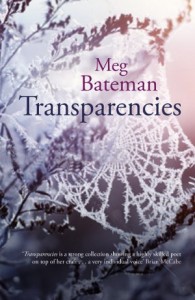Blog Review 44 – Clare Best Reviews ‘Transparencies’ by Meg Bateman
I’ve now been reading Transparencies, on and off, for almost two years. This is a good period of time over which to think about a collection that works across Gaelic and English as well as seeming to span at least one lifetime of experience.
Bateman made her name as a poet in Gaelic, though not as a native speaker. This is her first largely English collection. In Transparencies, some poems (though only twelve in a collection of sixty-four) are presented bilingually with the Gaelic originals on the verso, the poet’s own translations into English on the recto. The other poems appear in their sole English form. I know not one word of Gaelic and yet the Gaelic poems surprised and delighted me each time I encountered them. I was enchanted by looking at this strange rich language, full of consonantal clusters. I kept trying to lay the English over the Gaelic, or vice versa – one way in which the title of the collection began to work its charm.
I appreciate the way the book is divided into clear groups of poems. This too has a pleasing transparency, which in turn gives way to others. Section IV opens with ‘Wordlessness’, a concise meditation on the adequacies and inadequacies of language, and moves via ‘Indian Nights’ in which the speaker longs for “a poem/to hold those nights,/for we have scattered/and others sit there,/and memory sheers away”, to the witty and playful ‘An A to Z of Greek Etymologies’. In these close groupings, each poem directly informs its neighbouring poems, and each group informs the groups around it.
Transparency is constantly at work in the collection. Different worlds or modes of existence seem to connect or overlap. People (the father in ‘Death Makes You Forever More’ or ‘Lullaby for My Father’) or creatures (‘Dead Otter’) are more alive after they have died; past and present appear to conflate (‘Return Visit to Lewis’); the speaker of a poem sometimes sees through this world to another or even inhabits two worlds at once (‘The Deer’).
All this seeing through, layering and juxtaposing of different levels of awareness is manifested and sustained in a beautiful economy and transparency of craft. The light can shine through just because there is no superfluous material, reminding me of Donne’s “gold to airy thinness beat”.
The poems work on the ear as well as on and in the eye, and perhaps in their aural quality they also owe something to traditions of Gaelic song. And Bateman knows how to judge the length of each poem. The shortest are sometimes devastatingly effective: ‘Regret’, ‘Embrace’. ‘Sundial’, ‘Mentor’ and ‘Dead Child’:
Nothing makes sense of the baby’s death,
neither the leafy shadows
on the dusty church windows,
nor the creaking harmonium
and marble pomp within,until the little mother stands
with milk-laden breasts
to give thanks for those days
and nine months
and speaks of the boy as a gift,when she becomes a towering tree
filtering sunlight into our darkened brains.
But when greater length is used, it feels as natural as the brevity of the short poems. The astonishingly poignant ‘Poems to a Dead Sister’ is a sequence numbered I to X but these appear in the Contents and later on the page as one poem, numbered 46. This in itself, the contradiction between the construct of ‘poems’ and ‘poem’, suggests another kind of transparency – a seeing through to a grievous state of mind in which one poem in ten parts cannot be enough, and yet all ten poems are found to be of a piece.
The back cover states that Transparencies is ‘still perhaps shaped by a Gaelic aesthetic’. As an English reader I do feel a strong ‘otherness’ in the consciousness behind the poems – of course not being a reader or speaker of Gaelic I can’t say whether that’s because the aesthetic is specifically Gaelic. But living with the poems – with their clear light, their truth and their uncanniness – has taken me back to a week I spent on Iona some years ago, when I was overwhelmed by my sense of being in a place where the veil between worlds and realities is thinner than thin. I was intoxicated with excitement about this and at the same time I experienced an almost unbearable vulnerability. I have had identical sensations on reading and rereading the poems in this collection over the past two years.
Transparencies is as strong as crystal, as fragile as film, as wise as water.
Clare Best
Clare Best’s first full collection, Excisions, was shortlisted for the Seamus Heaney Centre Prize, 2012. Other poetry publications include: Treasure Ground (HappenStance 2009), Breastless (Pighog 2011) and Cell (Frogmore 2015). Recent work has appeared in The Next Review, The Rialto, The Interpreter’s House, Under the Radar. Clare’s prose memoir was runner-up in the Mslexia Memoir Competition 2014/15.
Transparencies by Meg Bateman is published by Polygon, £9.99
(to read previous Magma blog reviews, please click on the ‘reviews’ tag immediately below)
This Post Has 2 Comments
Comments are closed.


 Supported by Arts Council England
Supported by Arts Council England
just love the idea that these poems remove the veil between the two worlds a must read thank you
Meg was one of my teachers for Celtic Studies at university back in the 90’s. I’m very happy to read your review of her work, and to recently hear she has been recognised for her contribution to scholarship and research by her current institution Sabhal Mor Ostaig. My poetry journey is still in its infancy but I will take strength from Meg’s journey.